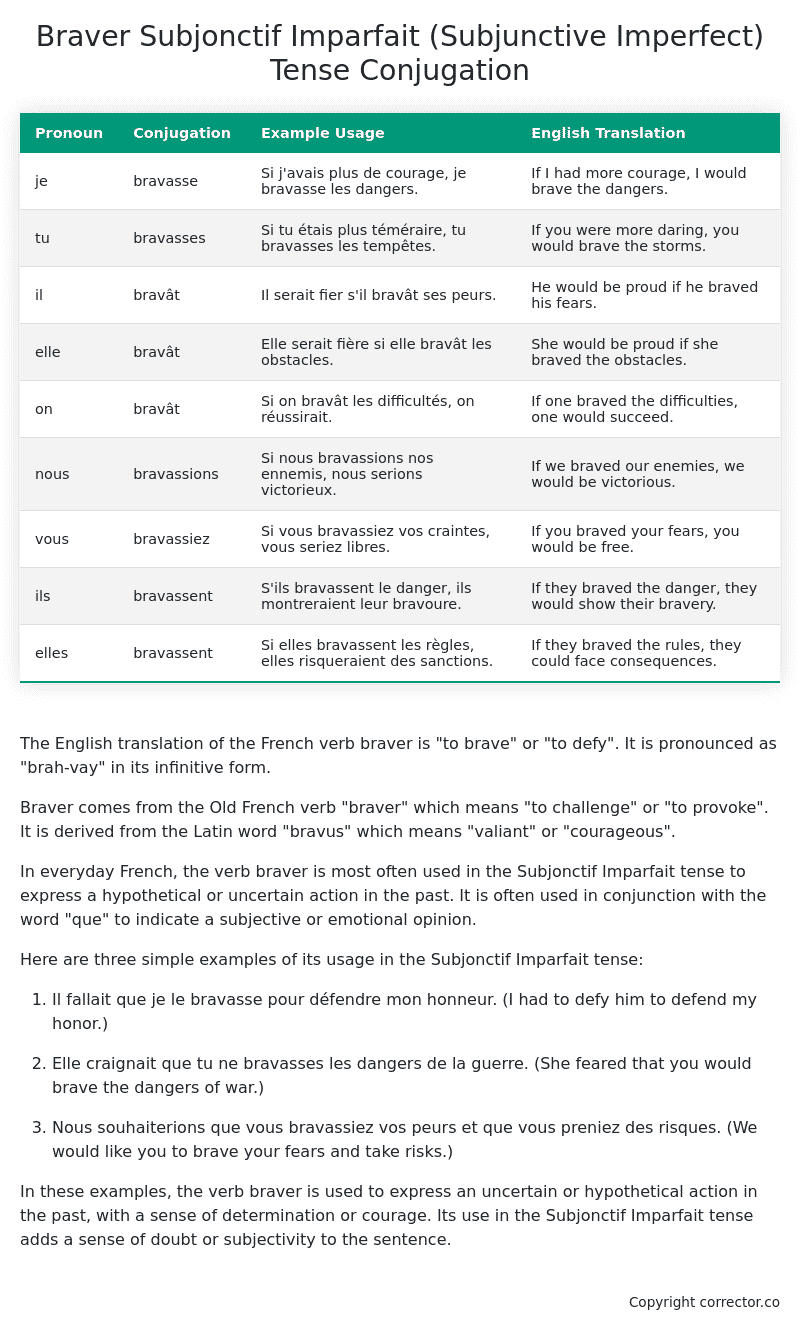Subjonctif Imparfait (Subjunctive Imperfect) Tense Conjugation of the French Verb braver
Introduction to the verb braver
The English translation of the French verb braver is “to brave” or “to defy”. It is pronounced as “brah-vay” in its infinitive form.
Braver comes from the Old French verb “braver” which means “to challenge” or “to provoke”. It is derived from the Latin word “bravus” which means “valiant” or “courageous”.
In everyday French, the verb braver is most often used in the Subjonctif Imparfait tense to express a hypothetical or uncertain action in the past. It is often used in conjunction with the word “que” to indicate a subjective or emotional opinion.
Here are three simple examples of its usage in the Subjonctif Imparfait tense:
-
Il fallait que je le bravasse pour défendre mon honneur. (I had to defy him to defend my honor.)
-
Elle craignait que tu ne bravasses les dangers de la guerre. (She feared that you would brave the dangers of war.)
-
Nous souhaiterions que vous bravassiez vos peurs et que vous preniez des risques. (We would like you to brave your fears and take risks.)
In these examples, the verb braver is used to express an uncertain or hypothetical action in the past, with a sense of determination or courage. Its use in the Subjonctif Imparfait tense adds a sense of doubt or subjectivity to the sentence.
Table of the Subjonctif Imparfait (Subjunctive Imperfect) Tense Conjugation of braver
| Pronoun | Conjugation | Example Usage | English Translation |
|---|---|---|---|
| je | bravasse | Si j’avais plus de courage, je bravasse les dangers. | If I had more courage, I would brave the dangers. |
| tu | bravasses | Si tu étais plus téméraire, tu bravasses les tempêtes. | If you were more daring, you would brave the storms. |
| il | bravât | Il serait fier s’il bravât ses peurs. | He would be proud if he braved his fears. |
| elle | bravât | Elle serait fière si elle bravât les obstacles. | She would be proud if she braved the obstacles. |
| on | bravât | Si on bravât les difficultés, on réussirait. | If one braved the difficulties, one would succeed. |
| nous | bravassions | Si nous bravassions nos ennemis, nous serions victorieux. | If we braved our enemies, we would be victorious. |
| vous | bravassiez | Si vous bravassiez vos craintes, vous seriez libres. | If you braved your fears, you would be free. |
| ils | bravassent | S’ils bravassent le danger, ils montreraient leur bravoure. | If they braved the danger, they would show their bravery. |
| elles | bravassent | Si elles bravassent les règles, elles risqueraient des sanctions. | If they braved the rules, they could face consequences. |
Other Conjugations for Braver.
Le Present (Present Tense) Conjugation of the French Verb braver
Imparfait (Imperfect) Tense Conjugation of the French Verb braver
Passé Simple (Simple Past) Tense Conjugation of the French Verb braver
Passé Composé (Present Perfect) Tense Conjugation of the French Verb braver
Futur Simple (Simple Future) Tense Conjugation of the French Verb braver
Futur Proche (Near Future) Tense Conjugation of the French Verb braver
Plus-que-parfait (Pluperfect) Tense Conjugation of the French Verb braver
Passé Antérieur (Past Anterior) Tense Conjugation of the French Verb braver
Futur Antérieur (Future Anterior) Tense Conjugation of the French Verb braver
Subjonctif Présent (Subjunctive Present) Tense Conjugation of the French Verb braver
Subjonctif Passé (Subjunctive Past) Tense Conjugation of the French Verb braver
Subjonctif Imparfait (Subjunctive Imperfect) Tense Conjugation of the French Verb braver (this article)
Subjonctif Plus-que-parfait (Subjunctive Pluperfect) Tense Conjugation of the French Verb braver
Conditionnel Présent (Conditional Present) Tense Conjugation of the French Verb braver
Conditionnel Passé (Conditional Past) Tense Conjugation of the French Verb braver
L’impératif Présent (Imperative Present) Tense Conjugation of the French Verb braver
L’infinitif Présent (Infinitive Present) Tense Conjugation of the French Verb braver
Struggling with French verbs or the language in general? Why not use our free French Grammar Checker – no registration required!
Get a FREE Download Study Sheet of this Conjugation 🔥
Simply right click the image below, click “save image” and get your free reference for the braver Subjonctif Imparfait tense conjugation!

Braver – About the French Subjonctif Imparfait (Subjunctive Imperfect) Tense
Formation
Common Everyday Usage Patterns
Interactions with Other Tenses
Subjonctif Présent
Indicatif Passé Composé
Conditional
Conditional Perfect
Summary
I hope you enjoyed this article on the verb braver. Still in a learning mood? Check out another TOTALLY random French verb conjugation!


